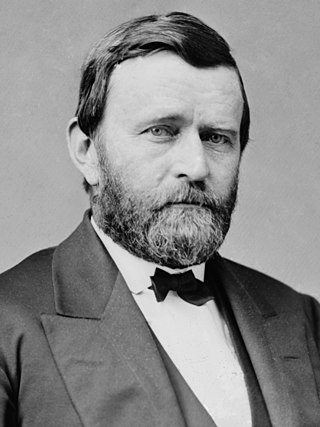
Presidential elections were held in the United States on November 3, 1868. In the first election of the Reconstruction Era, Republican nominee Ulysses S. Grant defeated Horatio Seymour of the Democratic Party. It was the first presidential election to take place after the conclusion of the American Civil War and the abolition of slavery. It was the first election in which African Americans could vote in the reconstructed Southern states, in accordance with the First Reconstruction Act.

The Digges Amendment was an amendment to the Maryland Constitution, proposed in 1910, to curtail the Fifteenth Amendment of the United States Constitution and disenfranchise black voters in the state with the use of a property requirement. It was an initiative by predominately white conservative Democratic Party members in the state.

The Brooks–Baxter War, also known as the Brooks–Baxter Affair, Arkansas Civil War, or the Second American Civil War was an attempt made by failed gubernatorial candidate Joseph Brooks of the “Brindle-tail” faction of Arkansas' Republican Party to take control of the state from Elisha Baxter, who was the Republican governor. The victor in the end was the Baxter administration, also known as the "Minstrels", supported by some "carpetbaggers" and Democrats over the Brindle-tails supported by "scalawags" and "freedmen".
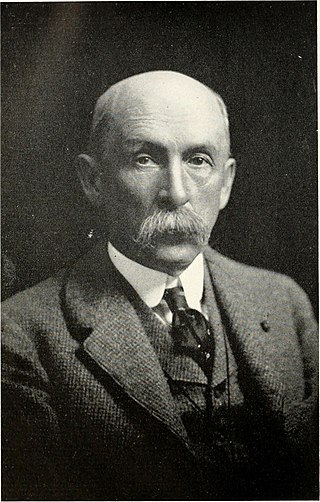
Daniel Henry Chamberlain was an American planter, lawyer, author and the 76th Governor of South Carolina from 1874 until 1876 or 1877. The federal government withdrew troops from the state and ended Reconstruction that year. Chamberlain was the last Republican governor of South Carolina until James B. Edwards was elected in 1974.
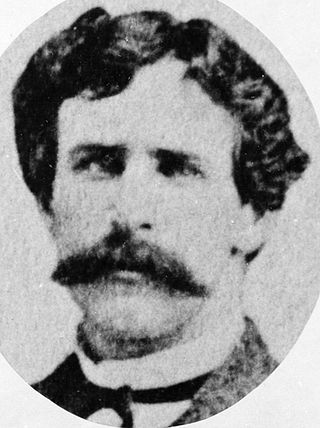
Franklin Israel Moses Jr. was a South Carolina lawyer and editor who became active as a Republican politician in the state during the Reconstruction Era. He was elected to the legislature in 1868 and served as Speaker of the South Carolina House of Representatives. He was governor in 1872, serving into 1874. Enemies labelled him the 'Robber Governor'.
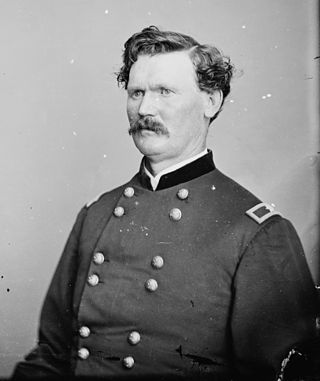
Robert Kingston Scott was an American Republican politician, the 74th governor of South Carolina, and an officer in the Union Army during the American Civil War. In 1891 he built a Queen Anne Italianate Victorian home in Napoleon, Ohio and lived there until his death in 1900. It still stands to this day in Napoleon on the corner of W. Clinton Street and Haley Ave.

The 1938 South Carolina gubernatorial election was held on November 8, 1938, to select the governor of the state of South Carolina. Burnet Rhett Maybank, Mayor of Charleston, South Carolina, won the contested Democratic primary and defeated Republican Joseph Augustis Tolbert in the general election becoming the 99th governor of South Carolina.

The 1876 South Carolina gubernatorial election was held on November 7, 1876, to select the governor of the state of South Carolina. The election campaign was a referendum on the Radical Republican-led state government and their Reconstruction policies. Opponents disputed the challenger Wade Hampton III's victory, gained by a margin of little more than 1100 votes statewide. But he took office in April 1877, after President Hayes withdrew federal troops as a result of a national Democratic compromise, and the incumbent Daniel Henry Chamberlain left the state.

The 1865 South Carolina gubernatorial election was held on October 18, 1865, to elect the governor of South Carolina. It was the first election in which the voters of South Carolina were able to directly choose the governor as a result of the ratification of the South Carolina Constitution of 1865. However, the constitution only permitted for white men to cast ballots, with blacks being forbidden from voting.

The 1870 South Carolina gubernatorial election was held on October 19, 1870, to select the governor of the state of South Carolina. Governor Robert Kingston Scott easily won reelection based entirely on the strength of the black vote in the state. The election was significant because white conservatives of the state claimed it showed that political harmony between the white and black races was impossible and only through a straightout Democratic attempt would they be able to regain control of state government.

The 1872 South Carolina gubernatorial election was held on October 16, 1872, to select the governor of the state of South Carolina. Franklin J. Moses, Jr. won the election as a Radical Republican against the more moderate faction of the Republican Party and became the 75th governor of South Carolina.

The 1874 South Carolina gubernatorial election was held on November 3, 1874, to select the governor and lieutenant governor of the state of South Carolina. Daniel Henry Chamberlain won the election and became the 76th governor of South Carolina.

The 1974 South Carolina gubernatorial election was held on November 5, 1974 to select the governor of the state of South Carolina. Initially considered a longshot candidate, Republican James B. Edwards defeated Democrat W. J. Bryan Dorn with a narrow majority of the vote.

The 1990 South Carolina gubernatorial election was held on November 6, 1990 to select the governor of the state of South Carolina. Governor Carroll A. Campbell Jr., the popular Republican incumbent, handily defeated Democrat Theo Mitchell to become only the second governor at the time elected to a second consecutive four-year term.

The 1994 South Carolina gubernatorial election was held on November 8, 1994, to select the governor of the state of South Carolina. The contest featured two politicians from the Upstate and David Beasley narrowly defeated Nick Theodore to become the 113th governor of South Carolina.

The 1880 South Carolina gubernatorial election was held on November 2, 1880 to s elect the governor of South Carolina. Johnson Hagood was nominated by the Democrats and ran against L. W. R. Blair, a Greenback-Labor candidate. Hagood easily won the general election and became the 80th governor of South Carolina.

The 1882 South Carolina gubernatorial election was held on November 7, 1882 to select the governor of the state of South Carolina. Hugh Smith Thompson was nominated by the Democrats and ran against J. Hendrix McLane, a Greenback-Labor candidate. Thompson easily won the general election and became the 81st governor of South Carolina.

The 1896 South Carolina gubernatorial election was held on November 3, 1896 to select the governor of the state of South Carolina. William Haselden Ellerbe won the Democratic primary and easily won the general election to become the 86th governor of South Carolina.

In 1868, the Democrats nominated former New York Governor Horatio Seymour for President and Francis Preston Blair Jr. for Vice President. The Seymour-Blair ticket ran on a platform which supported national reconciliation and states' rights, opposed Reconstruction, and opposed both Black equality and Black suffrage. Meanwhile, the Republican presidential ticket led by General Ulysses S. Grant benefited from Grant's status as a war hero and ran on a pro-Reconstruction platform. Ultimately, the Seymour-Blair ticket ended up losing to the Republican ticket of General Ulysses S. Grant and House Speaker Schuyler Colfax in the 1868 U.S. presidential election.
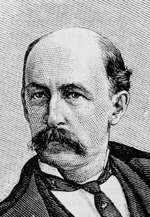
From December 1876 to April 1877, the Republican and Democratic parties in South Carolina each claimed to be the legitimate government. Both parties declared that the other had lost the election and that they controlled the governorship, the state legislature, and most state offices. Each government debated and passed laws, raised militias, collected taxes, and conducted other business as if the other did not exist. After four months of contested government, Daniel Henry Chamberlain, who claimed the governorship as a Republican, conceded to Democrat Wade Hampton III on April 11, 1877. This came after President Rutherford Hayes withdrew federal troops from the South.























